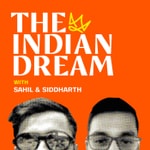The Indian Dream – Details, episodes & analysis
Podcast details
Technical and general information from the podcast's RSS feed.


The Indian Dream tells the stories of the profitable, long term thinker, risk-taker Entrepreneur because the country needs to be told that there's also a way to build long term value generating businesses in the era of VC funded hyper-growth engines. We wish to use these voices to showcase the strength of the Indian entrepreneurial spirit that forms the backbone of the nation.
Recent rankings
Latest chart positions across Apple Podcasts and Spotify rankings.
Apple Podcasts
🇩🇪 Germany - entrepreneurship
17/09/2024#80
Spotify
No recent rankings available
Shared links between episodes and podcasts
Links found in episode descriptions and other podcasts that share them.
See all- https://www.bensound.com
1875 shares
- http://www.bensound.com
1295 shares
- https://indiauncut.com/clear-writing/
226 shares
- https://twitter.com/sahil071
44 shares
- https://twitter.com/sidbetala
44 shares
- https://twitter.com/amitvarma
19 shares
RSS feed quality and score
Technical evaluation of the podcast's RSS feed quality and structure.
See allScore global : 78%
Publication history
Monthly episode publishing history over the past years.
Scaling a Manufacturing Business to Rs. 550 Cr in 8 Years | Make in India | Sukrit Bharati
Season 1 · Episode 168
samedi 16 septembre 2023 • Duration 57:15
Make In India.
The three words that will define the future of the country.
We have a trade deficit of close to $100 Bn with China. That's Rs. 83,000 Crores that leaves the country and isn't used for our own development.
Virtuoso Optoelectronics is a manufacturing company that started in 2015 with the idea of making electronic products in India. Started with circuit boards, then manufactured LEDs and now for the last three years, they've been manufacturing Air Conditioners.
I talk to Sukrit about this fantastic journey of scaling to Rs. 330 Cr in Revenue in 8 years!
If you want to stay updated about our latest episodes or just want to say hi, you can join our No Spam WhatsApp group here: https://bit.ly/3Q0To2K
Behind the Scenes of Movie Production | Producer of Lust Stories & Bombay Talkies | Ashi Dua | Founder of Flying Unicorn Entertainment
Season 1 · Episode 167
lundi 4 septembre 2023 • Duration 44:44
Movie Production. It's something that most of us don't know much about. I host Ashi Dua, Founder of Flying Unicorn Entertainment to talk about her work in producing movies like Lust Stories, Bombay Talkies, Paava Kadhaigal and More!
Episode Timeline:
(01:09) - Introduction of Ashi Dua
(03:39) - Why did Ashi move to Bombay?
(07:12) - Ashi’s introduction to movie production
(10:10) - Anurag’s role in Ashi’s career
(11:53) - Anurag’s style of making movies
(14:42) - What does production entail?
(17:23) - Producer’s involvement in the finances
(18:27) - Producer’s compensation
(19:15) - Bombay Talkies and bringing 4 directors together
(22:17) - How do producers put projects together?
(24:20) - Skills needed to be a producer
(28:37) - Is the industry segregated for producers?
(31:05) - Predicting Bollywood’s trends
(35:17) - Choosing the right platform for a movie
(38:01) - How does someone find their footing in the industry?
(39:45) - The Dhoom Dhaam Company
India's Largest Tech School - Masai ft Prateek Shukla
Season 1 · Episode 158
dimanche 18 décembre 2022 • Duration 55:55
On this episode, we talk to Prateek Shukla, Co-Founder and CEO at Masai School
Prateek is an IIT Kanpur Graduate, a Teach for India Alum and Ex-Founder of Grabhouse, a real-estate tech startup that was acquired by Commonfloor and subsequently by Quikr. He’s a second time entrepreneur who is picking up his first love of teaching.
India has 444 Million People that are in the 0-18 Years Age Bracket. That’s 400 Million people coming into the workforce over the next 15 to 20 years. For them to be contribute to India’s economic growth, we have a mammoth task of giving them the right skills.
We have over 45000 College and Institutes in the country and you would think we are slowly but surely building capacity to educate and train the 400 million people over the next 2 decades.
But, the grim reality on the ground that a large majority of students graduating from these institutions have NO employable skills. For example, of the 1.5 Million engineers that graduate, only 3% secure high paying technology jobs. The situation is even worst in Business and Humanities courses. The education industry is a money-making, recession proof business that’s being run purely on the fact that every parent wants their kid to hold a ‘degree’. It doesn’t matter if it’s useful or not, the societal shame from not having one is good enough reason to pour money into getting your child through college for 3 to 4 years.
The lack of employable talent coming out of college is HUGE problem to solve if we want to achieve The Indian Dream of becoming a large developed economy with a high per capita income. And to solve this problem, whatever we done so far isn’t working. The core reason why colleges suck in India is because there’s no incentive alignment. The college gets their fees regardless of the fact that the student might not even get a decent job after graduating. But, what if colleges got paid only after the graduating students earned.
And that’s where I find the model of Outcome driven education or Income Share Agreements very very interesting. It’s a model where the institute only gets paid after students start earning a baseline salary. What this also does is it opens up education to talented students who previously who couldn’t afford high fees of these colleges.
On the episode today, we have Prateek Shukla, Co-Founder and CEO of Masai School who is pioneering the Income Share Agreement or outcome driven model of education India. Masai is a 3 year old startup that helps students learn coding for free in a 6 months, military style coding bootcamp. They work with students with no coding or computer science background, and train them through their rigouros program. They have an income share agreement where they can make up to 3 Lakhs as a cost for the education, only and only if the students get a salary of more than 5 Lakhs per annum.
There’s no doubt Vocational Training is key to make large sections of society employment ready and productive. Only on the back of skilled talent, can you build large industries that contribute significantly to the GDP of the country. We’ve seen this play out in China where they used skilled labor and technology to build the world’s Manufacturing hub.
For India, a similar opportunity lies in being the Software hub of the world. And for that to happen, we need to train millions of students every year. Over the next 50 minutes, I talk to Prateek about the thesis behind Masai School, how they teach students, what are the execution challenges of training 7000 Students, and about their partnership with National Skill Development Coloration.
Trends: Blockchain & Cryptocurrencies Ft. Nishchal Shetty, WazirX
Season 1 · Episode 68
mercredi 7 avril 2021 • Duration 59:47
We've been creating these podcasts and newsletters for the last 9 months and if you like what we do, consider supporting the The Indian Dream Project. Link below.
If you want to support us, you can contribute here.
In the episode today, we host Nishchal Shetty of WazirX to talk about the world of Blockchain and Cryptocurrencies. We avoid speculating on bitcoin prices and instead focus on the fundamentals of blockchain.
Blockchain and Crypto are often misunderstood. In order to understand it better, Nishchal broke down the four primary blockchain use cases:
- Asset: These are store of values, deflationary in nature. Bitcoin is the perfect example for this.
- Currencies: These are equivalent to digital currencies, inflationary in nature. A Digital INR will fit into this category.
- Utility: These are blockchains that are used to run various different programs and smart contracts. For example: Ethereum is a blockchain used to run different blockchain programs and Ether is the token used to run these programs.
- Security: This is when the blockchain is used to back real world securities like stocks and properties.
We also discuss the various applications of Blockchain from Decentralised Finance, NFTs, and Supply Chain Traceability.
And we touch upon the regulatory environment of Crypto and Blockchain in India and the future of this technology.
If you're curious about the world of blockchain, highly recommend you listen to the episode. If you're not curious, well, this IS the future, might help learning about it now!
Business Munchies: Swiggy + Tinder, Memes as a Service, AI Personal Stylists ft. Dine with Data
Season 1 · Episode 67
samedi 3 avril 2021 • Duration 46:50
Sahil (@sahil071) & Siddharth (@sidbetala) hang out with the folks from Dine With Data, Vedika & Armaan, to discuss some great new ideas that we wouldn't have thought up on our own.
Dine with Data is an amazing daily WhatsApp newsletter that introduces you to a new startup everyday so that you're always aware of the latest business trends.
Join Dine with Data WhatsApp newsletter here.
While you're at it, join The Indian Dream WhatsApp newsletter as well!
(00:00) - Introduction
(00:33) - Swiggy + Tinder
(08:07) - Personal Stylists
(20:19) - "Vibe Curation" - Service business to make your cafe more instagrammable
(27:15) - Micro Private Equity
(37:45) - Memes as a Service
The Business Ideas we discussed
- Swiggy + Tinder - Ordering on food delivery apps these days is a chore - the Paradox of Choice makes it so difficult to choose a restaurant or an item, especially when you're in a group setting. The idea is to make Tinder like tiles where people can just swipe right or left on pictures of food that they find attractive or unattractive. If you're not able to get API access from Swiggy or Zomato - you can create a UI layer getting data from other sources and then linking the backend to Dunzo.
- Tinder + Swiggy - Swiggy has so much data on our eating habits - why not make a dating service which uses this data on eating habits to make predictions on possible matches?
- AI Personal Stylists - Today, only the rich and famous can afford personal stylists - why can't we democratise this service? You can build an AI powered recommendation engine which looks at your closet of clothes and makes recommendations on clothes matches that you would've otherwise never thought of. This plays into the same long tail game that Netflix uses to always keep content fresh.
- You could also build this as a B2B service which integrates with existing ecommerce store and makes it easier for them to recommend clothing to existing customers based on past buying trends.
- A Lenskart like model which scans your body would be able to show you how different clothes would fit your body and give you exact size recommendations as well.
- "Vibe Curation" - Whether we like it or, the Instagrammability of café's & restaurants determines their success these days. You can build a service which helps make the physical spaces and the individual dishes more instagrammable to drive the social virality of the space. It could even be a monthly subscription where the decor is changed each month.
- Micro Private Equity - A new movement led by companies like Thras.io & Tiny Capital where you build a portfolio of small internet business - SaaS products, Amazon FBA, DTC brands - in a particular niche and use economies of scale on marketing knowledge, etc. to help scale up your portfolio.
- Memes as a Service - Inspired by a listener building Marque Berry (the website is incomplete). He has built a Meme Influencer marketing business where he'll help you make your product 'viral' on various instgram meme pages. A great marketing tool for D2C brands & anyone who's looking to reach Gen Z audiences. Send me a mail if you want to talk to him.
Trends: Private Communities - The Quorum Club ft. Vivek Narain
Season 1 · Episode 66
mercredi 31 mars 2021 • Duration 53:27
A couple of weeks back, we covered the Trend of Paid or Private Communities. We explored the rise of these communities amongst millenials and Gen Z and looked at the opportunities that exist in this space in our Trends Newsletter.
Today, we have Vivek Narain, Founder of The Quorum, a Member only lifestyle club in Gurgaon with close to $1m ARR. Lifestyle clubs have always existed across the major cities in India. Think the Gymkhanas and Golf Clubs. But, these clubs are now fairly saturated and the philosophy there is to now keep people out as opposed to letting them in. These clubs have been designed for quote , unquote Old Money. And that left space for likes of Quorum to cater to the needs of new money and evolving tastes.
Quorum offers a high end luxurious space for a wide range of services, starting from Hospitality, Wellness, Cultural events and even co-working spaces. The focus is on diversity within the member community and the pricing structure has been designed to keep it more accessible for a wide range of demographic.
This is an asset heavy business, but if done right, can be extremely profitable. We talk to Vivek about the thesis behind Quorum, the economics and what it takes to make a physical private community work.
This was an interesting episode for us, as one of our primary goals with The Indian Dream Project is to build a community of knowledge seeking entrepreneurs to help each other build profitable businesses. And if you have any aspirations to build a community, even a digital one, I recommend you listen to the episode.
Business Munchies: Regional Newsletters, Plant Based Foods, PE Fund for Regional Profitable Businesses
Season 1 · Episode 65
samedi 27 mars 2021 • Duration 33:13
Sahil (@sahil071) & Siddharth (@sidbetala) announce a new Referral Reward - you can be invited onto this podcast if you get enough referrals to our newsletter. Here's the link that you can use to generate your referral code!
(0:00) - Referral Campaign Thanks
(0:45) - Decentraland
(3:20) - Regional Newsletters - The New Tropic
(14:52) - The rise of Plant Based Foods & Beverages
(21:00) - PE Fund for Regional Profitable Companies
Join the No Spam WhatsApp Group
- Decentraland - A new virtual world that's combining two hot topics: NFT's & the Metaverse. You can buy pieces of land in the game that are permanently yours using NFT's and then you can use that land to showcase everything else you've bought on the metaverse like your Gucci bags or whatever else. This is the direction of the future and we should keep our eyes on it.
- Regional and Niche Newsletters - First saw this as a Tweet by Tanvi Dessai. Regional Newsletters are basically a digital version of something that's existed for centuries - local newspapers. People always want to know what's going on in our surrounding areas and there's no reason why this can't go digital. The New Tropic does $1.5 million in ad revenue just by focusing on Miami - it's now branched out to several other smaller cities in the US. There's no reason to just bifurcate by region - you can also do it by topic. One WhatsApp newsletter charges Rs. 11,000 per year for giving daily commodity prices updates on commodities not easily found in the exchanges. Another idea is to take Business Updates (government mandates, commodity prices, etc.) and just simplify it without any Business Gossip (who raised how much, etc.).
- The Rise of Plant Based Foods & Beverages - Amul placed a full page ad in several leading newspaper about the Myths & Facts of Plant Based Milks/Beverages. This move by Amul is an indication of the rise of Plant Based products in general such as meat alternatives, plant milks, Tofu, Tempeh, etc. Plant based milks already do about 150 - 200 crores of revenue in India and one of our community members also launched a brand called Oat MLK (please support him). Another community member is building Better - an amazing vegan food company - I highly recommend their spreads.This is a huge topic that we'll cover in a future trends series.
- PE Fund for Regional Profitable Companies - My favourite idea from this episode. Siddharth met a CA who invested early in several regional snack brands (like Bikaji, Yellow Diamond, etc.) and helped them professionalise and expand their reach. He is now set to make a bonanza as all these snack brands have matured and are planning IPO's. A PE fund can be built to focus on a particular sector (snack brands, industrial products, ice creams, whatever else) and tries to find regional players throughout India and help them scale up.
The Business of Restaurants ft. Sameer Seth of Hunger Inc (The Bombay Canteen) - Founder Journey
Season 1 · Episode 64
mercredi 24 mars 2021 • Duration 01:10:17
This episode is a deep dive into the business of Restaurants.
Hunger Inc.
Sameer Seth
TID Whatsapp Newsletter (No Spam)
We talk to Sameer Seth, Co-founder of Hunger Inc. They've created brands such as The Bombay Canteen, O Pedro & very recently, The Bombay Sweet Shop.
Now if you're not from Bombay, you might not have heard about these places. But, ask your friend who lives in Bombay, and they'll most probably have good things to say about these places.
We talk to Sameer about his journey of moving from a Banking career to the F&B space, how he went about entering a new Industry and the experience that he gathered before starting Hunger Inc.
We also talk about a wide range of topics, all within the purview of building a profitable F&B business. We talk about the thesis behind The Bombay Canteen, what it takes to start a restaurant focused on providing great experience at affordable prices, how they think about the menu, pricing and customer service and the economics of a restaurant business. At the end, we talk about the thesis on starting a Direct to Consumer New Age Mithai brand in The Bombay Sweet shop, something we've discussed in our previous Business Munchies episode.
Talking to Sameer, I realised Story-telling is a big part of getting food right and it was interesting to hear some of Sameer's stories of building Hunger Inc. If you're curious about the F&B or hospitality space, don't miss out on this episode.
This episode is a homage to Chef Floyd Cardoz, Co-founder of Hunger Inc and a bunch of other top class restaurants in New York. He passed away last year due to Covid-19. We thank him for everything that he has done and backing Sameer and Yash to create Hunger Inc.
Business Munchies: TID Book Giveaway, Equity Crowdfunding, Biostimulants, Warehousing as a Service, High End Locks
Season 1 · Episode 63
vendredi 19 mars 2021 • Duration 33:28
We're doing our first Giveaway! We'll be sending the book 'Psychology of Money' by Morgan Housel to 5 people who help us get the highest number of referrals for our Newsletter. Here's the link that you can use to generate your referral code.
Sahil (@sahil071) & Siddharth (@sidbetala) munch on these ideas during the episode:
(00:50) - The Indian Dream Book Giveaway - Psychology of Money
(02:06) - Gumroad Investment & Equity Crowdfunding
(09:05) - Biostimulants & Sea6 Energy
(16:25) - Manufacturing & Warehousing as a Service (MaaS, WaaS)
(28:52) - High end locks
Li Jin's article on Passion Economy and Future of Work
- The Indian Dream Book Giveaway - Psychology of Money by Morgan Housel - One of the best books both of us have ever read about Wealth Management & Accumulation. We'll be giving away 5 copies to the people who get the most people to sign up to The Indian Dream Newsletter. Here's the referral link that you can use for this campaign.
- Gumroad Investment & Equity Crowdfunding: As per SEBI guidelines, equity crowdfunding is still illegal in India - despite India overall being much more lax in its rules than the US SEC. Equity Crowdfunding is basically a chance for retail investors to invest in early stage startups - think Kickstarter but you actually get Equity in the company in which you invest. Gumroad - the creator platform - raised $5 million on the Republic.co platform which itself raised $35 million. The same day, the SEC had raised the maximum allowable capital raise from Equity Crowdfunding from $1.07 million to $5 million - expect a lot more companies use this method for raising early money but also expect a lot more fraud.
- Biostimulants & Sea6 Energy: On this podcast, we are obsessed with anything related to agriculture and especially Seaweed. India has become the first country in the world to pass legislations about Biostimulants and Sea6 Energy has become one of the first companies in the world to receive a patent for a Seaweed based biostimulant. And Sea6 Energy is raising a $5 million Series A round right now. On a previous episode, we spoke to Mr. Abhiram Seth from AquaAgri Processing about the future of Seaweed biostimulants and he said that this is just the start - there's a lot of room for growth in this industry.
- Manufacturing & Warehousing as a Service (MaaS, WaaS) for D2C companies: D2C companies are good at Marketing and they try to outsource everything else. Warehousing is a growing and profitable part of this changing business model. Can you build a warehousing marketplace with a software layer on top that helps D2C companies find the best warehousing space for their products. Same thing can be done for manufacturing.
- High End Locks
Trends #11.1: Private Communities - Leap.Club Ft Ragini Das
Season 1 · Episode 62
mercredi 17 mars 2021 • Duration 25:57
Private communities are being built across India and globally as traditional communities built around religion, physical location and trade are being disrupted. New age digital first communities focused on hobbies and learning interests are gaining traction.
Leap.Club is one of those exciting private communities that is shaping the landscape of India. Only a year after its founding, Leap.Club has 1000 paying members and more than 8000 people in the waitlist.
But this is not a one-off phenomenon.
The Quorum, a Members Only Club in Gurgaon, has more than 700 members paying them Rs. 75000 per year. Makerpad, an online paid community of No-Code enthusiasts was recently acquired by Zapier for millions of dollars.
Private Communities Newsletter
Ragini Das, Co-Founder Leap.club
Well, to dig deeper into the world of Private Communities, we have Ragini Das, Co-Founder of Leap Club, a Private network for Women.
An Army Kid, Ragini traveled the length and breadth of the country before starting her career at Trident. She then went on to work at Zomato and was part of the team that conceptualized Zomato Gold. Last year, she co-founded Leap Club and has had an interesting journey scaling Leap Club to 1000 Paying members and with 8000 more members in the waiting list.
We talk to her about the workings of Leap and the opportunities in this space.
Please follow us on Spotify and Rate us on Apple Podcasts.









